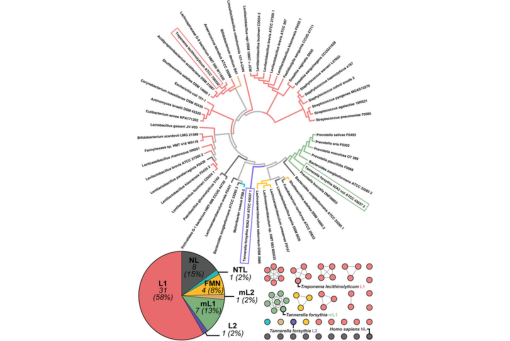Microbial beta-glucuronidases drive human periodontal disease etiology
Abstract
Periodontitis is a chronic inflammatory disease associated with persistent oral microbial dysbiosis. The human β-glucuronidase (GUS) degrades constituents of the periodontium and is used as a biomarker for periodontitis severity. However, the human microbiome also encodes GUS enzymes, and the role of these factors in periodontal disease is poorly understood. Here, we define the 53 unique GUSs in the human oral microbiome and examine diverse GUS orthologs from periodontitis-associated pathogens. Oral bacterial GUS enzymes are more efficient polysaccharide degraders and processers of biomarker substrates than the human enzyme, particularly at pHs associated with disease progression. Using a microbial GUS-selective inhibitor, we show that GUS activity is reduced in clinical samples obtained from individuals with untreated periodontitis and that the degree of inhibition correlates with disease severity. Together, these results establish oral GUS activity as a biomarker that captures both host and microbial contributions to periodontitis, facilitating more efficient clinical monitoring and treatment paradigms for this common inflammatory disease.
Citation
Lietzan, A. D., Simpson, J. B., Walton, W. G., Jariwala, P. B., Xu, Y., Boynton, M. H., Liu, J., & Redinbo, M. R. (2023). Microbial β-glucuronidases drive human periodontal disease etiology. Science Advances, 9(18). https://doi.org/10.1126/sciadv.adg3390


